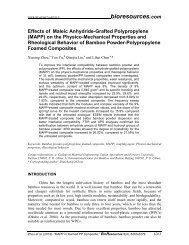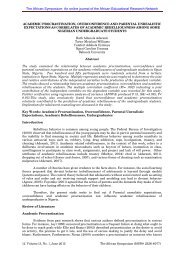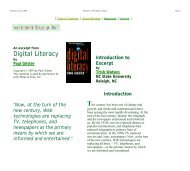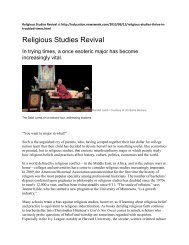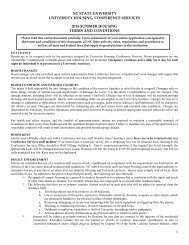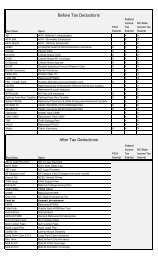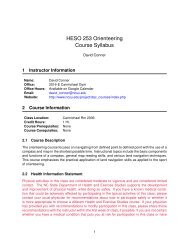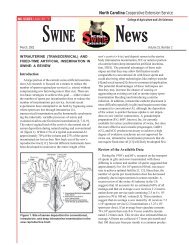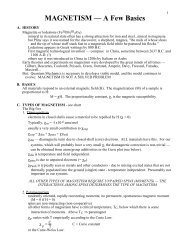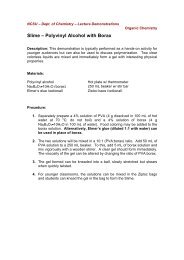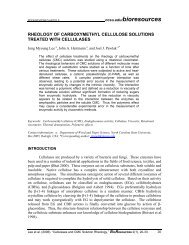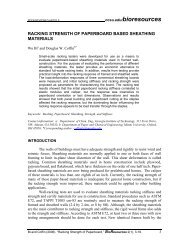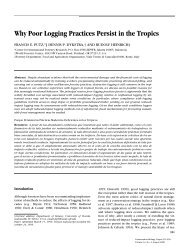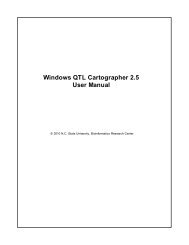the envisioned dialectic of national integration and nation building in ...
the envisioned dialectic of national integration and nation building in ...
the envisioned dialectic of national integration and nation building in ...
You also want an ePaper? Increase the reach of your titles
YUMPU automatically turns print PDFs into web optimized ePapers that Google loves.
The African Symposium: An onl<strong>in</strong>e journal <strong>of</strong> <strong>the</strong> African Educational Research Network<br />
THE ENVISIONED DIALECTIC OF NATIONAL INTEGRATION AND NATION BUILDING<br />
IN A HETEROGENEOUS SETTING: A STYLISTIC CRITICISM OF REMI RAJI’S<br />
LOVESONG FOR MY WASTELAND<br />
Adeyemi Adegoju<br />
Obafemi Awolowo University<br />
Abstract<br />
This article exam<strong>in</strong>es Remi Raji’s alternative model <strong>of</strong> consensus <strong>build<strong>in</strong>g</strong> <strong>in</strong> a heterogeneous<br />
country like Nigeria that is cont<strong>in</strong>ually threatened by forces <strong>of</strong> dis<strong><strong>in</strong>tegration</strong>. The article considers<br />
<strong>the</strong> ‘Prologue’ to Remi Raji’s anthology, Lovesong for My Wastel<strong>and</strong>, which is presented <strong>in</strong> <strong>the</strong> form<br />
<strong>of</strong> a dramatic poem/poetic drama as an allegory <strong>of</strong> <strong>the</strong> challenges <strong>in</strong>herent <strong>in</strong> <strong>the</strong> task <strong>of</strong> <strong><strong>nation</strong>al</strong><br />
<strong><strong>in</strong>tegration</strong> <strong>and</strong> <strong>the</strong> prospect <strong>of</strong> fruitful <strong>in</strong>ter-group relations <strong>in</strong> Nigeria. It underl<strong>in</strong>es <strong>the</strong> expediency<br />
<strong>of</strong> <strong>dialectic</strong> <strong>in</strong> <strong>the</strong> characters’ engagement <strong>of</strong> grave <strong><strong>nation</strong>al</strong> issues, focus<strong>in</strong>g on <strong>the</strong> argumentation<br />
thrust <strong>of</strong> <strong>the</strong> discourse as a template for productive <strong><strong>nation</strong>al</strong> dialogue. Aside <strong>the</strong> logic <strong>of</strong> <strong>dialectic</strong>, <strong>the</strong><br />
paper exam<strong>in</strong>es <strong>the</strong> stylistic markers that typify <strong>the</strong> discourse <strong>of</strong> consensus <strong>build<strong>in</strong>g</strong>, highlight<strong>in</strong>g <strong>the</strong><br />
characters’ discursive practices as prototype verbal signifiers that <strong>the</strong> heterogeneous entities with<strong>in</strong><br />
<strong>the</strong> Nigerian political space could deploy for renewed patriotic spirit.<br />
Key Words: Dialectic, <strong>in</strong>ter-group relations, <strong>nation</strong> <strong>build<strong>in</strong>g</strong>, <strong><strong>nation</strong>al</strong> <strong><strong>in</strong>tegration</strong>, Nigeria<br />
Introduction<br />
The crisis <strong>of</strong> <strong>nation</strong>hood besett<strong>in</strong>g Nigeria as a country has been a dom<strong>in</strong>ant issue expressed<br />
<strong>in</strong> <strong>the</strong> works produced by not only literary writers but also by artistes <strong>of</strong> different climes <strong>and</strong> times.<br />
With particular reference to fix<strong>in</strong>g <strong>the</strong> problem <strong>of</strong> ethnic <strong><strong>nation</strong>al</strong>ism <strong>and</strong> <strong><strong>nation</strong>al</strong> <strong><strong>in</strong>tegration</strong><br />
required for <strong><strong>nation</strong>al</strong> rebirth, I consider Remi Raji’s anthology titled Lovesong for My Wastel<strong>and</strong> a<br />
literary response that dramatises this knotty issue <strong>in</strong> a most critical manner that deserves attention.<br />
Remi Raji belongs to <strong>the</strong> third generation <strong>of</strong> Nigerian poets whose works have been markedly political<br />
<strong>in</strong> nature given <strong>the</strong>ir disillusionment with <strong>the</strong> palpable setbacks be<strong>in</strong>g suffered by Nigeria despite her<br />
enormous potential. This <strong>the</strong>matic preoccupation derives from a ‘<strong><strong>nation</strong>al</strong>ist imagi<strong>nation</strong>’ which (Egya<br />
2007: 112) expla<strong>in</strong>s as ‘<strong>the</strong> use <strong>of</strong> creative writ<strong>in</strong>g, a product <strong>of</strong> imagi<strong>nation</strong>, to make important<br />
political statements <strong>and</strong> redirect people’s th<strong>in</strong>k<strong>in</strong>g towards positive change […]’.<br />
What particularly strikes me <strong>in</strong> Remi Raji’s treatment <strong>of</strong> political <strong>the</strong>me <strong>in</strong> this anthology as<br />
embodied <strong>in</strong> <strong>the</strong> ‘Prologue’ is <strong>the</strong> artistry with which he h<strong>and</strong>les <strong>the</strong> motifs <strong>of</strong> dialogue <strong>and</strong> consensus<br />
<strong>build<strong>in</strong>g</strong> as <strong>in</strong>gredients for realistic <strong>in</strong>ter-group relations that have eluded a pluralistic country like<br />
Nigeria for so long. Hav<strong>in</strong>g closely read <strong>the</strong> text, I am particularly <strong>in</strong>terested <strong>in</strong> <strong>the</strong> po<strong>in</strong>t <strong>of</strong> conflict<br />
among <strong>the</strong> characters <strong>in</strong> <strong>the</strong> dramatic poem/poetic drama, <strong>the</strong>ir archetypal roles, <strong>the</strong> peculiar sett<strong>in</strong>g<br />
<strong>the</strong>y <strong>in</strong>habit but perceive differently, <strong>the</strong> sequence <strong>and</strong> patterns <strong>of</strong> argumentation <strong>the</strong>y put up <strong>in</strong><br />
address<strong>in</strong>g <strong>the</strong> press<strong>in</strong>g <strong><strong>nation</strong>al</strong> issues that form <strong>the</strong> basis for <strong>the</strong>ir dialogu<strong>in</strong>g, <strong>and</strong> f<strong>in</strong>ally <strong>the</strong><br />
unification <strong>of</strong> hi<strong>the</strong>rto dissent<strong>in</strong>g voices <strong>in</strong> play<strong>in</strong>g active roles <strong>in</strong> <strong>the</strong> task <strong>of</strong> <strong>build<strong>in</strong>g</strong> <strong>the</strong> country.<br />
Thus, my major concern <strong>in</strong> this paper is to explore a prototype discourse <strong>of</strong> <strong><strong>nation</strong>al</strong><br />
<strong><strong>in</strong>tegration</strong> <strong>and</strong> <strong>nation</strong> <strong>build<strong>in</strong>g</strong> as proposed by Remi Raji, exam<strong>in</strong><strong>in</strong>g <strong>the</strong> <strong>dialectic</strong>al processes that <strong>the</strong><br />
symbolic characters <strong>in</strong> <strong>the</strong> ‘Prologue’ undergo before <strong>the</strong>y could reach a consensus that favours<br />
<strong><strong>nation</strong>al</strong> cohesion, reconciliation <strong>and</strong> renewed sense <strong>of</strong> patriotism to one’s country. In order to show<br />
<strong>the</strong> rhetorical dynamics that f<strong>in</strong>d expression <strong>in</strong> <strong>the</strong> <strong>dialectic</strong>al processes <strong>of</strong> <strong>the</strong> characters’ dialogue, I<br />
attempt to stylistically analyse <strong>the</strong> def<strong>in</strong><strong>in</strong>g schemes <strong>and</strong> tropes <strong>of</strong> <strong>the</strong> prototype result-oriented<br />
dialogue that is most desirable <strong>in</strong> a heterogeneous country like Nigeria.<br />
Dilemma <strong>of</strong> National Integration <strong>in</strong> Nigeria<br />
Accord<strong>in</strong>g to (Congressional Research Service 2008) ‘Summary’ on current issues <strong>in</strong> Nigeria,<br />
Nigeria faces serious social <strong>and</strong> economic challenges which have made its human development<br />
<strong>in</strong>dicators among <strong>the</strong> world’s lowest, as <strong>the</strong> majority <strong>of</strong> <strong>the</strong> population suffer from extreme poverty.<br />
(Fagey<strong>in</strong>bo 2011) observes that Nigeria is faced with many social problems like fraud, embezzlement<br />
<strong>of</strong> public funds, ethnicity <strong>and</strong> nepotism, <strong>and</strong> serious crimes such as bribery, smuggl<strong>in</strong>g <strong>and</strong> bunker<strong>in</strong>g.<br />
While <strong>the</strong>se problems <strong>in</strong> <strong>the</strong>mselves would not prove too <strong>in</strong>tractable to fix, <strong>the</strong> composition <strong>of</strong> <strong>the</strong><br />
entity known as Nigeria <strong>and</strong> <strong>the</strong> consequent attitude <strong>and</strong> commitment <strong>of</strong> ‘Nigerians’ to address<strong>in</strong>g<br />
1 Volume 13, No. 1, June 2013 The African Symposium (ISSN# 2326-8077)
The African Symposium: An onl<strong>in</strong>e journal <strong>of</strong> <strong>the</strong> African Educational Research Network<br />
<strong><strong>nation</strong>al</strong> issues are suspect.<br />
(Metumara 2010: 92) rightly h<strong>in</strong>ts at <strong>the</strong> hub <strong>of</strong> Nigeria’s development challenges, say<strong>in</strong>g:<br />
‘Nigeria is an amalgam <strong>of</strong> rival ethnic groups pitched aga<strong>in</strong>st each o<strong>the</strong>r [sic] <strong>in</strong> a contest for power<br />
<strong>and</strong> resources that have reflected <strong>in</strong> <strong>the</strong> political processes, sometimes threaten<strong>in</strong>g <strong>the</strong> corporate<br />
existence <strong>of</strong> <strong>the</strong> country’. Writ<strong>in</strong>g on <strong>the</strong> aftermath <strong>of</strong> such a political arrangement, (Omotoso 2010:<br />
146) argues:<br />
Instead <strong>of</strong> be<strong>in</strong>g patriotic by support<strong>in</strong>g <strong>and</strong> respect<strong>in</strong>g <strong>the</strong> state, <strong>the</strong>y see it as an abstract<br />
object, a European formation <strong>and</strong> <strong>the</strong>refore an evil arrangement that denied <strong>the</strong> people <strong>of</strong><br />
<strong>the</strong>ir freedom. Because <strong>of</strong> this endur<strong>in</strong>g notion <strong>of</strong> <strong>the</strong> Nigerian state by <strong>the</strong> people, <strong>the</strong>y have<br />
had recourse to <strong>the</strong>ir various <strong>in</strong>digenous societies which to <strong>the</strong>m are capable <strong>of</strong> protect<strong>in</strong>g <strong>and</strong><br />
guarantee<strong>in</strong>g <strong>the</strong>ir <strong>in</strong>dividual rights, privileges <strong>and</strong> advancement <strong>in</strong> <strong>the</strong> Nigerian state.<br />
(Metumara 2010: 97) <strong>the</strong>n submits that ‘[t]he heterogeneous nature <strong>of</strong> <strong>the</strong> Nigerian state <strong>and</strong><br />
<strong>the</strong> problem it poses to <strong>nation</strong>-<strong>build<strong>in</strong>g</strong> is well recognised by its managers’. This has been an <strong>in</strong>herent<br />
problem <strong>in</strong> <strong>the</strong> Nigerian polity which dates back to <strong>the</strong> pre-<strong>in</strong>dependence era <strong>and</strong> has cont<strong>in</strong>ued to<br />
threaten <strong>the</strong> corporate existence <strong>of</strong> <strong>the</strong> country even long after <strong>in</strong>dependence. To this end, (Salawu<br />
<strong>and</strong> Hasan 2011: 28) observe:<br />
About five decades after Nigeria ga<strong>in</strong>ed <strong>in</strong>dependence, <strong>the</strong> Nigerian diverse social structure <strong>in</strong><br />
terms <strong>of</strong> her heterogeneity has not changed significantly. The diversity nature <strong>of</strong> <strong>the</strong> society<br />
has made identification with <strong>the</strong> ‘<strong>nation</strong>’ a difficult task. Today, identification is easier at both<br />
family <strong>and</strong> ethnic levels. A consequence <strong>of</strong> this is that many <strong>of</strong> <strong>the</strong> citizens may never develop<br />
a proper concept <strong>of</strong> <strong>nation</strong>. This k<strong>in</strong>d <strong>of</strong> ethnic group relations signifies a negative dimension<br />
<strong>and</strong> which may mean much for <strong>the</strong> Nigerian political system.<br />
(Ekanola 2006: 279) exam<strong>in</strong>es Nigeria’s socio-political <strong>and</strong> economic circumstances <strong>and</strong><br />
concludes that many <strong>of</strong> its problems stem from its orig<strong>in</strong> as an artificial colonial construct which<br />
lumped toge<strong>the</strong>r a variety <strong>of</strong> separate peoples. Consequently, <strong>the</strong> relations between <strong>the</strong>m have been<br />
that <strong>of</strong> mutual distrust which (Julius-Adeoye 2011: 2) captures thus: ‘The <strong>nation</strong>’s <strong>in</strong>ability to<br />
effectively develop an <strong>in</strong>tegrated population even with its enormous wealth creates defensive groups<br />
along <strong>the</strong> ethno-religious l<strong>in</strong>es, <strong>in</strong> effect creat<strong>in</strong>g a dichotomy <strong>of</strong> ‘we’ aga<strong>in</strong>st <strong>the</strong> ‘o<strong>the</strong>rs’’.<br />
(Ifeanacho <strong>and</strong> Nwagwu 2009) are <strong>of</strong> <strong>the</strong> view that Nigeria’s efforts at achiev<strong>in</strong>g <strong><strong>nation</strong>al</strong><br />
<strong><strong>in</strong>tegration</strong> have rema<strong>in</strong>ed largely unrealised, consider<strong>in</strong>g issues <strong>of</strong> m<strong>in</strong>ority question, religious<br />
conflicts, ethnic politics, resource control <strong>and</strong> <strong>the</strong> call for a sovereign <strong><strong>nation</strong>al</strong> conference.<br />
Consequently, <strong>the</strong> spirit <strong>of</strong> true <strong><strong>nation</strong>al</strong>ism needed to address <strong>the</strong> myriad problems confront<strong>in</strong>g <strong>the</strong><br />
country has been lack<strong>in</strong>g, as ethnic <strong><strong>nation</strong>al</strong>ism <strong>in</strong> Nigeria cont<strong>in</strong>ues to work aga<strong>in</strong>st <strong>the</strong> <strong><strong>in</strong>tegration</strong> <strong>of</strong><br />
<strong>the</strong> different ethnic <strong><strong>nation</strong>al</strong>ities. Comment<strong>in</strong>g on <strong>the</strong> <strong><strong>nation</strong>al</strong>istic spirit required for execut<strong>in</strong>g <strong>the</strong><br />
Nigerian project, (Ekanola 2006: 291-292) writes:<br />
The Corpus<br />
[…] <strong>the</strong> <strong><strong>in</strong>tegration</strong> <strong>of</strong> <strong>the</strong> ethnic <strong><strong>nation</strong>al</strong>ities <strong>in</strong> Nigeria requires a transformation <strong>of</strong> attitudes<br />
<strong>and</strong> values. This would entail a process <strong>of</strong> social mobilisation to teach <strong>and</strong> persuade members<br />
<strong>of</strong> different <strong><strong>nation</strong>al</strong>ities to see one ano<strong>the</strong>r as people with whom <strong>the</strong>y must rise <strong>and</strong> fall<br />
toge<strong>the</strong>r, <strong>and</strong> br<strong>in</strong>g <strong>the</strong>m to a belief that <strong>the</strong>ir dest<strong>in</strong>ies are <strong>in</strong>extricably knit toge<strong>the</strong>r <strong>in</strong> such a<br />
way that <strong>the</strong>y ei<strong>the</strong>r w<strong>in</strong> toge<strong>the</strong>r or lose toge<strong>the</strong>r.<br />
The study, as rightly po<strong>in</strong>ted out earlier, focuses ma<strong>in</strong>ly on <strong>the</strong> ‘Prologue’ to <strong>the</strong> anthology<br />
which comprises forty-five poems <strong>in</strong> all. In fact, <strong>the</strong> forty-five poems encapsulate <strong>the</strong> poet’s sense <strong>of</strong><br />
disillusionment occasioned by <strong>the</strong> Nigerian predicament <strong>and</strong> <strong>the</strong> ironic sense <strong>of</strong> patriotism that he<br />
demonstrates <strong>in</strong> spite <strong>of</strong> <strong>the</strong> near hopeless situation. In <strong>the</strong> figure <strong>of</strong> a physician who is able to<br />
diagnose <strong>the</strong> ills <strong>of</strong> society <strong>and</strong> would stop at noth<strong>in</strong>g short <strong>of</strong> prescrib<strong>in</strong>g <strong>the</strong> antidotes for heal<strong>in</strong>g his<br />
society, Remi Raji artistically enacts a dramatic poem/poetic drama <strong>in</strong> <strong>the</strong> ‘Prologue’ to raise social<br />
consciousness about his concerns <strong>in</strong> <strong>the</strong> forty-five poems <strong>in</strong> <strong>the</strong> anthology <strong>and</strong> to sell his vision for<br />
turn<strong>in</strong>g around <strong>the</strong> fortune <strong>of</strong> <strong>the</strong> country whose major problem has been that <strong>of</strong> f<strong>in</strong>d<strong>in</strong>g a common<br />
voice among <strong>the</strong> different ethnic groups whose sectional <strong>in</strong>terests <strong>and</strong> sheer ethnic loyalty have<br />
vitiated <strong>the</strong>ir <strong><strong>nation</strong>al</strong>istic spirit.<br />
2 Volume 13, No. 1, June 2013 The African Symposium (ISSN# 2326-8077)
The African Symposium: An onl<strong>in</strong>e journal <strong>of</strong> <strong>the</strong> African Educational Research Network<br />
The four characters that are engaged <strong>in</strong> <strong>the</strong> dialogue are Gong, Takie, Gambia <strong>and</strong> Asabi. It is<br />
Gong who br<strong>in</strong>gs a message (a wake-up call) to <strong>the</strong> o<strong>the</strong>r three characters on stage. Accord<strong>in</strong>g to (Egya<br />
2007: 115), ‘Gong sees himself […] as a s<strong>in</strong>ger whose song carries <strong>the</strong> ups <strong>and</strong> downs <strong>of</strong> history <strong>and</strong><br />
knows <strong>the</strong> consequences <strong>of</strong> yesterday’s failure’. But Takie, Gambia <strong>and</strong> Asabi do not share Gong’s<br />
views, as a result <strong>of</strong> which <strong>the</strong>y challenge him. Instead <strong>of</strong> Gong’s ab<strong>and</strong>on<strong>in</strong>g his vision <strong>in</strong> <strong>the</strong> face <strong>of</strong><br />
stiff opposition mounted by <strong>the</strong> o<strong>the</strong>r three characters, he exudes <strong>the</strong> spirit <strong>of</strong> tolerance, absorb<strong>in</strong>g all<br />
manner <strong>of</strong> criticisms from <strong>the</strong> o<strong>the</strong>r characters <strong>and</strong> reasonably engag<strong>in</strong>g <strong>the</strong>m <strong>in</strong> a thought-provok<strong>in</strong>g<br />
dialogue to <strong>the</strong> po<strong>in</strong>t <strong>of</strong> sway<strong>in</strong>g <strong>the</strong>m to share his dream, believe <strong>in</strong> his cause, <strong>and</strong> commit <strong>the</strong>mselves<br />
to <strong>the</strong> project <strong>of</strong> <strong>nation</strong> <strong>build<strong>in</strong>g</strong>. So, <strong>the</strong> structure <strong>of</strong> <strong>the</strong> dramatic poem/poetic drama revolves around<br />
Gong’s hav<strong>in</strong>g a dream <strong>and</strong> striv<strong>in</strong>g to sell it to an <strong>in</strong>different lot, engag<strong>in</strong>g <strong>in</strong> a series <strong>of</strong> arguments<br />
<strong>and</strong> counter-arguments on <strong>the</strong> veracity <strong>of</strong> his claims <strong>and</strong> f<strong>in</strong>ally reach<strong>in</strong>g a consensus that is born out<br />
<strong>of</strong> conviction <strong>and</strong> not belief.<br />
Why Dialectics?<br />
Accord<strong>in</strong>g to (H<strong>of</strong>fmann 2005), <strong>the</strong> notion <strong>of</strong> ‘<strong>dialectic</strong> is formed from <strong>the</strong> Greek verb<br />
dialegesthai whose first philosophical use has been ascribed to Zeno, a student <strong>of</strong> Parmenides. Lege<strong>in</strong><br />
means ‘to speak’, ‘to say’ <strong>and</strong> <strong>the</strong> prefix dia- can be translated as ‘through’. Accord<strong>in</strong>gly, <strong>the</strong> everyday<br />
use <strong>of</strong> dialegesthai <strong>in</strong> Greek was ‘hold<strong>in</strong>g converse with’, ‘discuss<strong>in</strong>g a question with ano<strong>the</strong>r’, or<br />
‘argu<strong>in</strong>g with one aga<strong>in</strong>st someth<strong>in</strong>g’. However, o<strong>the</strong>r philosophers from Plato, Immanuel Kant to<br />
Hegel have elaborated Zeno’s pioneer<strong>in</strong>g thought on <strong>the</strong> notion <strong>of</strong> <strong>dialectic</strong>. For Plato, <strong>dialectic</strong> is a<br />
method to organise, based on experience, our knowledge by structur<strong>in</strong>g hierarchies with<strong>in</strong> a world <strong>of</strong><br />
‘forms’, while Kant criticises as ‘<strong>dialectic</strong>al’ all approaches that forget to ground ‘knowledge’ <strong>in</strong><br />
concrete experience.<br />
Both Plato <strong>and</strong> Kant, however, would agree that <strong>dialectic</strong> belongs to what we as human be<strong>in</strong>gs<br />
are do<strong>in</strong>g when reflect<strong>in</strong>g on <strong>the</strong> world around us, be it a world <strong>of</strong> experience or a world <strong>of</strong> pure forms.<br />
That is, for <strong>the</strong>m, ‘<strong>dialectic</strong>’ is considered from <strong>the</strong> st<strong>and</strong>po<strong>in</strong>t <strong>of</strong> epistemology; <strong>the</strong> context for both is<br />
a general <strong>the</strong>ory <strong>of</strong> knowledge (epistêmê <strong>in</strong> Greek). Hegel’s concept <strong>of</strong> <strong>dialectic</strong> is different from <strong>the</strong><br />
views held by <strong>the</strong> earlier proponents. Accord<strong>in</strong>g to (H<strong>of</strong>fman 2005: 8), look<strong>in</strong>g for ‘what alone can be<br />
<strong>the</strong> true method <strong>of</strong> philosophical science’, Hegel h<strong>in</strong>ts at ‘<strong>dialectic</strong>’ as someth<strong>in</strong>g which belongs<br />
<strong>in</strong>herently to <strong>the</strong> respective contents <strong>of</strong> logic. Dialectic is not restricted to what we are do<strong>in</strong>g <strong>in</strong><br />
th<strong>in</strong>k<strong>in</strong>g <strong>and</strong> speak<strong>in</strong>g, but it is <strong>the</strong> <strong>in</strong>ner self-movement <strong>of</strong> <strong>the</strong> content <strong>of</strong> logic.<br />
(Popper 2004) argues that <strong>dialectic</strong> <strong>in</strong> <strong>the</strong> modern sense, that is, especially <strong>in</strong> <strong>the</strong> sense <strong>in</strong><br />
which Hegel used <strong>the</strong> term is a <strong>the</strong>ory which ma<strong>in</strong>ta<strong>in</strong>s that someth<strong>in</strong>g – more especially, human<br />
thought – develops <strong>in</strong> a way characterised by what is called <strong>the</strong> <strong>dialectic</strong> triad: <strong>the</strong>sis, anti<strong>the</strong>sis <strong>and</strong><br />
syn<strong>the</strong>sis. First, <strong>the</strong>re is some idea or <strong>the</strong>ory or movement which may be called a ‘<strong>the</strong>sis’. Such a <strong>the</strong>sis<br />
will <strong>of</strong>ten produce opposition, because like most th<strong>in</strong>gs <strong>in</strong> this world, it will probably be <strong>of</strong> limited<br />
value <strong>and</strong> will have its weak spots. The oppos<strong>in</strong>g idea or movement is called <strong>the</strong> ‘anti<strong>the</strong>sis’ because it<br />
is directed aga<strong>in</strong>st <strong>the</strong> <strong>the</strong>sis. The struggle between <strong>the</strong> <strong>the</strong>sis <strong>and</strong> <strong>the</strong> anti<strong>the</strong>sis goes on until some<br />
solution is reached. This solution which is <strong>the</strong> third step is called <strong>the</strong> ‘syn<strong>the</strong>sis’. Once atta<strong>in</strong>ed, <strong>the</strong><br />
syn<strong>the</strong>sis <strong>in</strong> its turn may become <strong>the</strong> first step <strong>of</strong> a new <strong>dialectic</strong> triad. (Popper 2004: 4), however,<br />
stresses that <strong>in</strong> actuality <strong>the</strong> <strong>the</strong>sis does not ‘produce’ <strong>the</strong> anti<strong>the</strong>sis but ‘it is only our critical attitude<br />
which produces <strong>the</strong> anti<strong>the</strong>sis <strong>and</strong> where such an attitude is lack<strong>in</strong>g – which <strong>of</strong>ten is <strong>the</strong> case – no<br />
anti<strong>the</strong>sis will be produced’. Popper fur<strong>the</strong>r stresses that we have to be careful not to th<strong>in</strong>k that it is<br />
<strong>the</strong> ‘struggle’ between a <strong>the</strong>sis <strong>and</strong> its anti<strong>the</strong>sis which ‘produces’ a syn<strong>the</strong>sis; for <strong>the</strong> struggle is one <strong>of</strong><br />
m<strong>in</strong>ds <strong>and</strong> <strong>the</strong>se m<strong>in</strong>ds must be productive <strong>of</strong> new ideas.<br />
Thus, <strong>dialectic</strong>al reason<strong>in</strong>g refers to critical th<strong>in</strong>k<strong>in</strong>g about problems <strong>and</strong> evaluat<strong>in</strong>g<br />
conflict<strong>in</strong>g viewpo<strong>in</strong>ts. It is best applied <strong>in</strong> resolv<strong>in</strong>g controversial issues <strong>and</strong> assess<strong>in</strong>g oppos<strong>in</strong>g<br />
positions. Dialectic is thus seen as an art <strong>of</strong> rational discussion <strong>in</strong> which a questioner <strong>and</strong> a respondent<br />
reason with each o<strong>the</strong>r by question <strong>and</strong> answer. It conta<strong>in</strong>s arguments <strong>and</strong> cha<strong>in</strong>s <strong>of</strong> connected steps<br />
<strong>of</strong> argumentation runn<strong>in</strong>g through <strong>the</strong> sequence <strong>of</strong> dialogue. It is adversarial but also partly<br />
collaborative. In <strong>the</strong> present poetic discourse, <strong>the</strong>refore, I will explore <strong>the</strong> processes <strong>of</strong> <strong>dialectic</strong>al<br />
reason<strong>in</strong>g <strong>in</strong> underst<strong>and</strong><strong>in</strong>g <strong>the</strong> mov<strong>in</strong>g back <strong>and</strong> forth between contrary l<strong>in</strong>es <strong>of</strong> reason<strong>in</strong>g <strong>in</strong> a<br />
prototype discourse <strong>of</strong> <strong><strong>nation</strong>al</strong> <strong><strong>in</strong>tegration</strong> <strong>in</strong> a heterogeneous sett<strong>in</strong>g.<br />
3 Volume 13, No. 1, June 2013 The African Symposium (ISSN# 2326-8077)
The African Symposium: An onl<strong>in</strong>e journal <strong>of</strong> <strong>the</strong> African Educational Research Network<br />
Dialectical Processes <strong>and</strong> Style Markers <strong>in</strong> Consensus Build<strong>in</strong>g: Remi Raji’s Bluepr<strong>in</strong>t<br />
From <strong>the</strong> outset, it is <strong>in</strong>structive to note that Remi Raji must have consciously designed <strong>and</strong><br />
packaged <strong>the</strong> characters as prototypes <strong>of</strong> <strong>the</strong> oppos<strong>in</strong>g parties that see <strong>the</strong> challenges confront<strong>in</strong>g<br />
Nigeria <strong>in</strong> different lights. While Gong is <strong>the</strong> visionary, <strong>the</strong> dreamer, <strong>the</strong> prophet, <strong>the</strong> great th<strong>in</strong>ker<br />
(<strong>the</strong> philosopher), <strong>the</strong> conscience <strong>of</strong> society, <strong>and</strong> <strong>the</strong> messiah, as it were, <strong>the</strong> o<strong>the</strong>r three characters are<br />
ra<strong>the</strong>r lethargic, as <strong>the</strong>y do not seem to be bo<strong>the</strong>red by <strong>the</strong> challenges <strong>in</strong> <strong>the</strong> country. In fact, <strong>the</strong><br />
nam<strong>in</strong>g pattern adopted by <strong>the</strong> poet is stylistic. The visionary is given <strong>the</strong> name Gong. What is <strong>the</strong><br />
import <strong>of</strong> that name <strong>in</strong> <strong>the</strong> Yoruba cultural world from where <strong>the</strong> poet comes?<br />
The gong <strong>in</strong> traditional Yoruba society is that communicative <strong>in</strong>strument that is used by <strong>the</strong><br />
<strong>in</strong>formation aide <strong>of</strong> <strong>the</strong> traditional ruler to arouse <strong>the</strong> consciousness <strong>of</strong> <strong>the</strong> populace to social issues<br />
dem<strong>and</strong><strong>in</strong>g <strong>the</strong> collective <strong>in</strong>terest <strong>of</strong> all <strong>and</strong> sundry. It is sounded loud <strong>and</strong> clear to reverberate <strong>in</strong><br />
every nook <strong>and</strong> cranny <strong>of</strong> <strong>the</strong> community such that no one would claim not to have heard <strong>the</strong> message<br />
<strong>of</strong> <strong>the</strong> gong <strong>in</strong> <strong>the</strong> h<strong>and</strong>s <strong>of</strong> <strong>the</strong> <strong>in</strong>formation aide. As an <strong>in</strong>strument <strong>of</strong> social mobilisation <strong>and</strong><br />
sensitisation, <strong>the</strong> gong seems to enjoy what I could call ‘communicative liberty’, as <strong>the</strong> Yoruba believe<br />
that <strong>the</strong> gong’s ‘voice’ is never silenced nor drowned (A kì í p’ohùn m’ágogo l’é̞nu). It does not matter<br />
<strong>the</strong> constra<strong>in</strong>ts, <strong>the</strong> odds, <strong>the</strong> limitations, <strong>the</strong> gong would f<strong>in</strong>d expression for <strong>the</strong> vital message it has<br />
for <strong>the</strong> people.<br />
To show <strong>the</strong> centrality <strong>of</strong> <strong>the</strong> gong to <strong>the</strong> poet’s <strong><strong>nation</strong>al</strong>ist imagi<strong>nation</strong> <strong>and</strong> vision <strong>in</strong> a society<br />
<strong>in</strong> dire need <strong>of</strong> renaissance, one would not only consider it as a cultural semiotic that <strong>the</strong> poet has<br />
stylistically <strong>in</strong>voked <strong>in</strong> this anthology to relay his message to <strong>the</strong> people but also as a persona that<br />
serves as <strong>the</strong> poet’s voice. We have to note that <strong>in</strong> a society where th<strong>in</strong>gs have gone awry, it takes <strong>the</strong><br />
gong to raise people’s awareness <strong>and</strong> sensitise <strong>the</strong>m on how to arrest <strong>the</strong> situation. So, <strong>in</strong> a like<br />
manner, it takes a Gong (<strong>the</strong> persona <strong>and</strong> s<strong>in</strong>ger) <strong>in</strong> a beleaguered society like Nigeria to sound a red<br />
alert to those who are still sleep<strong>in</strong>g while <strong>the</strong> house is on fire. In this sense, <strong>the</strong> literary writer, be it a<br />
poet, a novelist or a dramatist or <strong>the</strong> artiste who cuts <strong>the</strong> figure <strong>of</strong> <strong>the</strong> conscience <strong>of</strong> <strong>the</strong> country <strong>in</strong> <strong>the</strong><br />
midst <strong>of</strong> palpable moral <strong>and</strong> social degeneration is that coveted Gong needed to sound <strong>the</strong> wake-up<br />
call for transformation.<br />
In fact, <strong>the</strong> lesson for realistic <strong>nation</strong> <strong>build<strong>in</strong>g</strong> that must be learnt from <strong>the</strong> <strong>in</strong>teraction<br />
between Takie, Gambia <strong>and</strong> Asabi, on <strong>the</strong> one h<strong>and</strong>, <strong>and</strong> Gong, on <strong>the</strong> o<strong>the</strong>r h<strong>and</strong>, is that <strong>of</strong> <strong>the</strong><br />
semiotic <strong>of</strong> number. It does not take a multitude to diagnose <strong>the</strong> ills <strong>of</strong> society <strong>and</strong> come up with <strong>the</strong><br />
necessary antidote. Just an <strong>in</strong>dividual is enough to see <strong>the</strong> fault-l<strong>in</strong>e <strong>in</strong> <strong>the</strong> structure <strong>of</strong> <strong>the</strong> entity<br />
called a country. Just an <strong>in</strong>dividual is enough to raise <strong>the</strong> social consciousness <strong>of</strong> o<strong>the</strong>rs. Just an<br />
<strong>in</strong>dividual is enough to tactfully <strong>and</strong> reasonably make o<strong>the</strong>rs see what is possibly not open to all. But<br />
<strong>the</strong> question is: How easy would it be for that s<strong>in</strong>gular <strong>in</strong>dividual to match <strong>the</strong> dissent<strong>in</strong>g voices <strong>of</strong> <strong>the</strong><br />
multitude that would possibly see issues differently? So, <strong>in</strong> <strong>the</strong> task <strong>of</strong> <strong>nation</strong> <strong>build<strong>in</strong>g</strong>, <strong>the</strong> dichotomy<br />
<strong>of</strong> number or number differential – one social crusader with <strong>the</strong> dream <strong>and</strong> vision confronted with a<br />
multitude <strong>of</strong> lethargic disposition – is a factor but not enough a reason for <strong>the</strong> crusader to get<br />
defeated. All that is required is for that <strong>in</strong>dividual to have <strong>the</strong> resilience <strong>of</strong> <strong>the</strong> gong for realistic<br />
<strong><strong>nation</strong>al</strong> dialogue.<br />
Therefore, with<strong>in</strong> <strong>the</strong> situational context <strong>of</strong> <strong>the</strong> dramatic poem/poetic drama enacted <strong>in</strong> <strong>the</strong><br />
‘Prologue’ to Lovesong for My Wastel<strong>and</strong>, a m<strong>in</strong>iature <strong>of</strong> <strong>the</strong> Nigerian society with her myriad sociopolitical<br />
<strong>and</strong> economic problems call<strong>in</strong>g for attention, Gong cries out to <strong>the</strong> people:<br />
People <strong>of</strong> <strong>the</strong> l<strong>and</strong>, <strong>the</strong> liv<strong>in</strong>g <strong>and</strong> <strong>the</strong> dead,<br />
those today whose lives count for noth<strong>in</strong>g<br />
<strong>and</strong> those tomorrow who will live as if<br />
<strong>the</strong>y have no future, hear me out,<br />
it is your history I have come to sp<strong>in</strong><br />
<strong>in</strong> <strong>the</strong> marketplace <strong>of</strong> thought. Hear me now,<br />
it is <strong>the</strong> smell <strong>of</strong> your history that chokes <strong>the</strong> s<strong>in</strong>ger<br />
out <strong>of</strong> silence …<br />
(Lovesong for My Wastel<strong>and</strong>, p. 3)<br />
It is noteworthy that Gong does not see himself as a lone ranger, as he seeks to share what<br />
bo<strong>the</strong>rs his m<strong>in</strong>d with fellow compatriots. Such a disposition is necessary for viable <strong>nation</strong> <strong>build<strong>in</strong>g</strong>.<br />
Reach<strong>in</strong>g out to o<strong>the</strong>rs ei<strong>the</strong>r to sensitise or mobilise <strong>the</strong>m for action is <strong>in</strong> <strong>the</strong> collective <strong>in</strong>terest <strong>of</strong><br />
4 Volume 13, No. 1, June 2013 The African Symposium (ISSN# 2326-8077)
The African Symposium: An onl<strong>in</strong>e journal <strong>of</strong> <strong>the</strong> African Educational Research Network<br />
<strong>nation</strong> <strong>build<strong>in</strong>g</strong>, as we f<strong>in</strong>d out here that Gong does not target people <strong>of</strong> like m<strong>in</strong>ds. It is people who do<br />
not see what he sees, people who do not experience what he experiences or people who share <strong>the</strong> same<br />
experience but are <strong>in</strong>different that he calls on.<br />
The choice <strong>of</strong> Gong’s audience, <strong>the</strong>refore, becomes a signifier <strong>in</strong> itself for that seem<strong>in</strong>gly<br />
un<strong>in</strong>formed or laissez-faire audience wait<strong>in</strong>g to be sensitised for <strong>the</strong> task <strong>of</strong> <strong>nation</strong> <strong>build<strong>in</strong>g</strong>. In this<br />
sense, <strong>the</strong> choice <strong>of</strong> <strong>the</strong> nom<strong>in</strong>al element ‘people <strong>of</strong> <strong>the</strong> l<strong>and</strong> […]’ as opposed to ‘fellow comrades’ is<br />
stylistic; for it downplays sectional or class <strong>in</strong>terest. In order to reawaken <strong>the</strong> people’s consciousness<br />
to <strong>the</strong> challenges <strong>in</strong>herent <strong>in</strong> <strong>the</strong> system, Gong uses <strong>the</strong> temporal deictic elements ‘today’,<br />
‘tomorrow’/‘future’ to emphasise that time factor must not be wished away <strong>in</strong> matters <strong>of</strong> <strong><strong>nation</strong>al</strong> life.<br />
The poet is agitated with <strong>the</strong> unfavourable turn <strong>of</strong> events <strong>in</strong> <strong>the</strong> present <strong>and</strong> possible fur<strong>the</strong>r<br />
degeneration <strong>in</strong> <strong>the</strong> future for which he seeks to sensitise <strong>the</strong> people <strong>and</strong> consequently mobilise <strong>the</strong>m<br />
for a change <strong>of</strong> attitude needed for <strong><strong>nation</strong>al</strong> rebirth. This is <strong>the</strong> <strong>the</strong>sis <strong>of</strong> Gong’s message for <strong>the</strong><br />
people. This social commitment thrust on <strong>the</strong> part <strong>of</strong> <strong>the</strong> poet is what (Egya 2007: 111) refers to as<br />
‘Raji’s political <strong>the</strong>me […] to raise his society’s consciousness to <strong>the</strong> collapse <strong>of</strong> <strong><strong>nation</strong>al</strong> psyche <strong>and</strong> to<br />
redirect <strong>the</strong>ir attention toward a better tomorrow for which <strong>the</strong>y have to work’.<br />
In a tactical manner that is <strong>the</strong> hallmark <strong>of</strong> <strong>the</strong> dreamer who wishes to sell his or her dream to<br />
those who cannot possibly see beyond <strong>the</strong> present time, Gong uses <strong>the</strong> persuasive imperative<br />
structure: ‘hear me out’ to get <strong>the</strong> attention <strong>of</strong> his audience. It is by hear<strong>in</strong>g <strong>and</strong> not by shunn<strong>in</strong>g him<br />
that <strong>the</strong>y will get to know what <strong>the</strong> problems <strong>of</strong> <strong>the</strong> l<strong>and</strong> are <strong>and</strong> <strong>the</strong>n underst<strong>and</strong> <strong>the</strong> visionary’s<br />
perception <strong>of</strong> how to get round those problems. ‘Hear<strong>in</strong>g’ as a verb <strong>of</strong> <strong>in</strong>ert perception <strong>and</strong> cognition<br />
<strong>the</strong>n becomes a requisite signifier for hold<strong>in</strong>g <strong>and</strong> susta<strong>in</strong><strong>in</strong>g <strong><strong>nation</strong>al</strong> discourse among oppos<strong>in</strong>g<br />
parties.<br />
The spatial deictic element which serves as <strong>the</strong> centre stage or <strong>the</strong> forum for resolv<strong>in</strong>g <strong><strong>nation</strong>al</strong><br />
issues: ‘<strong>in</strong> <strong>the</strong> marketplace <strong>of</strong> thought’ is noteworthy. The imagery <strong>of</strong> <strong>the</strong> market <strong>in</strong> <strong>the</strong> traditional<br />
society is be<strong>in</strong>g <strong>in</strong>voked by <strong>the</strong> poet to make a statement about <strong>the</strong> k<strong>in</strong>d <strong>of</strong> atmosphere needed for<br />
realistic <strong><strong>nation</strong>al</strong> dialogue. At <strong>the</strong> market place, both <strong>the</strong> seller <strong>and</strong> buyer may have different positions<br />
on <strong>the</strong> value <strong>of</strong> <strong>the</strong> products, goods or services <strong>and</strong> how much should be spent on <strong>the</strong>m. However, <strong>in</strong><br />
<strong>the</strong> process <strong>of</strong> haggl<strong>in</strong>g, <strong>the</strong>y shift grounds <strong>and</strong> eventually arrive at a compromise that may favourable<br />
to both parties. The marketplace imagery thus becomes a semiotic for that unconstra<strong>in</strong>ed level play<strong>in</strong>g<br />
ground for stakeholders <strong>in</strong> a <strong><strong>nation</strong>al</strong> project to operate for realistic solutions to <strong><strong>nation</strong>al</strong> problems. It<br />
suggests that desirable sett<strong>in</strong>g, not a war front nor a battle field that stakeholders sometimes resort to<br />
<strong>in</strong> order to settle <strong>the</strong>ir differences. In fact, <strong>the</strong> use <strong>of</strong> <strong>the</strong> post-modifier ‘<strong>of</strong> thought’ to qualify <strong>the</strong><br />
sett<strong>in</strong>g is compell<strong>in</strong>g, as ‘thought’ is suggestive <strong>of</strong> a rational means <strong>of</strong> resolv<strong>in</strong>g issues as opposed to<br />
whipp<strong>in</strong>g up primordial sentiments or tak<strong>in</strong>g rash actions or decisions that would not help matters.<br />
Fur<strong>the</strong>rmore, <strong>the</strong> poet’s use <strong>of</strong> <strong>the</strong> temporal deictic element ‘now’ <strong>in</strong> ‘Hear me now […]’ shows <strong>the</strong><br />
sense <strong>of</strong> urgency with which <strong>the</strong> issues should be raised <strong>and</strong> discussed, as delay may be dangerous.<br />
In <strong>the</strong> spirit <strong>of</strong> a social crusader, <strong>the</strong> poet, us<strong>in</strong>g Gong as his mouthpiece, lays bare <strong>the</strong> burden<br />
<strong>of</strong> his heart on <strong>the</strong> predicament <strong>of</strong> <strong>the</strong> l<strong>and</strong>:<br />
I cannot deny my promise not to tell,<br />
but I cannot run away from <strong>the</strong> lashes <strong>of</strong> history.<br />
It bids me speak now so that our past shall not<br />
overtake our future.<br />
(Lovesong for My Wastel<strong>and</strong>, p. 3)<br />
History becomes a constant signifier <strong>in</strong> <strong>the</strong> discourse <strong>of</strong> <strong>nation</strong> <strong>build<strong>in</strong>g</strong> that can be ignored<br />
only at a country’s own peril. Hence, <strong>the</strong> poet’s use <strong>of</strong> <strong>the</strong> visual imagery <strong>of</strong> <strong>the</strong> ‘lashes <strong>of</strong> history’ from<br />
which he cannot run away conjures up before <strong>the</strong> reader <strong>the</strong> historical antecedents <strong>in</strong> <strong>the</strong> country’s<br />
annals which have <strong>in</strong>flicted open wounds not necessarily on <strong>the</strong> poet’s body but particularly on his<br />
heart. When someone suffers lashes on <strong>the</strong> body, he/she feels <strong>the</strong> pa<strong>in</strong>s from <strong>the</strong> bruises suffered. In a<br />
like manner, <strong>the</strong> poet’s suffer<strong>in</strong>g from <strong>the</strong> ‘lashes <strong>of</strong> history’ suggests that <strong>the</strong> history <strong>of</strong> <strong>the</strong> country<br />
causes <strong>the</strong> poet anguish <strong>and</strong> must have probably bruised his heart, as a result <strong>of</strong> which he needs<br />
heal<strong>in</strong>g for himself, his compatriots <strong>and</strong> <strong>the</strong> l<strong>and</strong> at large through <strong><strong>nation</strong>al</strong> reconstruction.<br />
Although it is <strong>of</strong>ten said that humans never or very rarely learn from history, <strong>the</strong> poet does not<br />
wish that this would be his lot <strong>and</strong> that <strong>of</strong> his fellow compatriots. Hence, <strong>in</strong> <strong>the</strong> paradoxical statement:<br />
‘It bids me speak now so that our past shall not / overtake our future’, <strong>the</strong> poet once aga<strong>in</strong> <strong>in</strong>vokes <strong>the</strong><br />
5 Volume 13, No. 1, June 2013 The African Symposium (ISSN# 2326-8077)
The African Symposium: An onl<strong>in</strong>e journal <strong>of</strong> <strong>the</strong> African Educational Research Network<br />
temporal deictic elements ‘past’ <strong>and</strong> ‘future’, explor<strong>in</strong>g <strong>the</strong> symbiosis <strong>of</strong> <strong>the</strong> two frames <strong>in</strong> such a<br />
logical sense that implies that what was done <strong>in</strong> <strong>the</strong> past (although conf<strong>in</strong>ed to <strong>the</strong> dustb<strong>in</strong> <strong>of</strong> history)<br />
has <strong>the</strong> propensity <strong>of</strong> tamper<strong>in</strong>g with <strong>the</strong> future. For <strong>the</strong> repugnant rem<strong>in</strong>iscences <strong>of</strong> history embodied<br />
<strong>in</strong> <strong>the</strong> olfactory imagery <strong>of</strong> ‘smell’ expressed <strong>in</strong> <strong>the</strong> nom<strong>in</strong>al structure ‘<strong>the</strong> smell <strong>of</strong> your history’ <strong>and</strong><br />
<strong>the</strong> visual imagery <strong>of</strong> ‘lashes’ expressed <strong>in</strong> <strong>the</strong> nom<strong>in</strong>al structure ‘<strong>the</strong> lashes <strong>of</strong> history’ have a way <strong>of</strong><br />
tell<strong>in</strong>g on <strong>the</strong> near or distant imag<strong>in</strong>ed future. So, <strong>the</strong> poet’s exhortation here sounds like an aphorism<br />
that rem<strong>in</strong>ds humans <strong>of</strong> <strong>the</strong> timelessness <strong>of</strong> <strong>the</strong>ir actions <strong>and</strong> <strong>in</strong>actions. For a Nigerian literary writer,<br />
Tayo Olafioye, even paradoxically titles his chronicle <strong>of</strong> <strong>the</strong> African/Nigerian experience <strong>in</strong> a piece<br />
entitled Tomorrow Left Us Yesterday (Olafioye 2004).<br />
As is characteristic <strong>of</strong> <strong>dialectic</strong>, Gong has an oppos<strong>in</strong>g party that is composed <strong>of</strong> Takie, Asabi<br />
<strong>and</strong> Gambia who doubt <strong>the</strong> s<strong>in</strong>cerity <strong>of</strong> his claims so far <strong>and</strong> <strong>the</strong>n put him to test, com<strong>in</strong>g up with <strong>the</strong>ir<br />
own respective anti<strong>the</strong>sis. And <strong>the</strong>y take turns to charge at him as follows:<br />
Takie: Hey who goes <strong>the</strong>re? Who goes on disturb<strong>in</strong>g <strong>the</strong> moment?<br />
Gambia: […] Who begs <strong>of</strong> you your hungry smell<strong>in</strong>g biography<br />
<strong>in</strong> a season fit only for bus<strong>in</strong>ess <strong>and</strong> leisure?<br />
Asabi: What do you have to tell us, […]?<br />
Has your ro<strong>of</strong> started leak<strong>in</strong>g all over […]?<br />
Not <strong>in</strong> this dry season?<br />
(Lovesong for My Wastel<strong>and</strong>, p. 4)<br />
It is pert<strong>in</strong>ent to note that <strong>in</strong>stead <strong>of</strong> shar<strong>in</strong>g Gong’s views right away, <strong>the</strong> o<strong>the</strong>r characters<br />
question <strong>the</strong> rationale beh<strong>in</strong>d his action <strong>and</strong> claims. The series <strong>of</strong> <strong>in</strong>terrogative sentences <strong>the</strong>y deploy<br />
<strong>in</strong> <strong>the</strong> process suggests <strong>the</strong>ir <strong>in</strong>ability to comprehend even <strong>in</strong> <strong>the</strong>ir wildest imagi<strong>nation</strong>s why an<br />
<strong>in</strong>dividual would attempt to <strong>in</strong>tercept what is popularly known <strong>in</strong> <strong>the</strong> Nigerian parlance as ‘bus<strong>in</strong>ess as<br />
usual’. This is a cliché that Nigerians have creatively co<strong>in</strong>ed to trivialise <strong>the</strong> social hiccups that are<br />
symptomatic <strong>of</strong> <strong>the</strong> fail<strong>in</strong>gs <strong>in</strong> <strong>the</strong> Nigerian system.<br />
In <strong>the</strong> present discourse, <strong>the</strong>refore, Takie, Gambia <strong>and</strong> Asabi seem to have resigned to fate,<br />
giv<strong>in</strong>g up on <strong>the</strong> Nigerian project <strong>and</strong> tak<strong>in</strong>g <strong>the</strong> socio-political realities as be<strong>in</strong>g normal <strong>and</strong>,<br />
<strong>the</strong>refore, not call<strong>in</strong>g for any redress. Therefore, <strong>the</strong> use <strong>of</strong> <strong>the</strong> nom<strong>in</strong>al elements ‘<strong>the</strong> moment’, ‘[…] a<br />
season fit only for bus<strong>in</strong>ess <strong>and</strong> leisure’ <strong>and</strong> ‘<strong>the</strong> peace’ serves to capture <strong>the</strong> people’s perception <strong>of</strong> <strong>the</strong><br />
state <strong>of</strong> <strong>the</strong> country, which to <strong>the</strong>m does not warrant any cause for alarm. Simply put, <strong>the</strong>se temporal<br />
markers are metaphors for that delusive ‘comfort zone’ <strong>the</strong> people seem to have settled for or <strong>the</strong> state<br />
<strong>of</strong> passive acceptance <strong>of</strong> <strong>the</strong> Nigerian condition. Would <strong>the</strong> poet as <strong>the</strong> conscience <strong>of</strong> society go to<br />
sleep <strong>in</strong> such a strange world or close his eyes to <strong>the</strong> rag<strong>in</strong>g peace that <strong>the</strong> people stoically seem to<br />
bear? It is <strong>the</strong>n left to Gong to make <strong>the</strong>m see reason by engag<strong>in</strong>g <strong>the</strong>m <strong>in</strong> rational dialogu<strong>in</strong>g.<br />
These characters’ assessment <strong>of</strong> <strong>the</strong> spatial <strong>and</strong> temporal sett<strong>in</strong>gs <strong>the</strong>y <strong>in</strong>habit with Gong but<br />
which <strong>the</strong>y perceive differently underl<strong>in</strong>es <strong>the</strong> essence <strong>of</strong> <strong>dialectic</strong>, as <strong>the</strong> ensu<strong>in</strong>g discourse is largely<br />
adversarial. If Gong claims that it is <strong>the</strong> ‘smell <strong>of</strong> your history that chokes <strong>the</strong> s<strong>in</strong>ger / out <strong>of</strong> silence<br />
[…]’ <strong>and</strong> yet Takie, Asabi <strong>and</strong> Gambia <strong>in</strong>stead <strong>of</strong> be<strong>in</strong>g ‘choked’ feel comfortable <strong>in</strong> <strong>the</strong> illusory ‘season<br />
<strong>of</strong> bus<strong>in</strong>ess <strong>and</strong> leisure’ <strong>and</strong> ‘peace’, <strong>the</strong>n <strong>the</strong> <strong>in</strong>herent contradictions <strong>in</strong> that society that are played out<br />
<strong>in</strong> <strong>the</strong> antonymous l<strong>in</strong>guistic elements need to thrashed out. The scenario echoes <strong>the</strong> proverbial<br />
account that what <strong>the</strong> dog sees <strong>and</strong> barks at ferociously is that which <strong>the</strong> sheep <strong>in</strong> turn sees <strong>and</strong> gazes<br />
at stupidly.<br />
To compound <strong>the</strong> task <strong>of</strong> <strong>the</strong> social crusader, <strong>the</strong> oppos<strong>in</strong>g characters do not consider <strong>the</strong><br />
plight a communal one, as <strong>the</strong>y keep on us<strong>in</strong>g <strong>the</strong> second person s<strong>in</strong>gular pronom<strong>in</strong>al forms ‘you’ <strong>and</strong><br />
‘your’ to downplay <strong>the</strong> collective <strong>in</strong>terest <strong>in</strong> Gong’s crusade. It is <strong>in</strong> fact noteworthy that Asabi th<strong>in</strong>ks<br />
that all that could call for Gong’s reach<strong>in</strong>g out to o<strong>the</strong>rs is on <strong>the</strong> condition that ‘your ro<strong>of</strong> has started<br />
leak<strong>in</strong>g all over […]’, with <strong>the</strong> possessive adjective ‘your’ suggest<strong>in</strong>g that it must be a personal<br />
experience that compels Gong’s perceived disturbance <strong>of</strong> public ‘peace’. Thus, <strong>the</strong> imagery <strong>of</strong> <strong>the</strong><br />
leak<strong>in</strong>g ro<strong>of</strong>top not even dur<strong>in</strong>g <strong>the</strong> ra<strong>in</strong>s but <strong>in</strong> an awkward ‘dry season’ suggests <strong>the</strong> weird condition<br />
which must have made Gong’s account a personal experience that may not necessarily be shared by<br />
<strong>the</strong> outsider.<br />
However, <strong>the</strong> social crusader seeks to provide answers to <strong>the</strong> questions posed by <strong>the</strong> oppos<strong>in</strong>g<br />
characters to underl<strong>in</strong>e <strong>the</strong> question-answer sequence <strong>of</strong> <strong>dialectic</strong> discourse. In order to conv<strong>in</strong>ce<br />
<strong>the</strong>m, he resorts to educat<strong>in</strong>g <strong>the</strong>m, mak<strong>in</strong>g <strong>the</strong>m realise that what <strong>the</strong>y perceive as a personal<br />
6 Volume 13, No. 1, June 2013 The African Symposium (ISSN# 2326-8077)
The African Symposium: An onl<strong>in</strong>e journal <strong>of</strong> <strong>the</strong> African Educational Research Network<br />
experience is <strong>in</strong>deed a communal one. There is <strong>the</strong>n <strong>the</strong> transmutation <strong>of</strong> <strong>the</strong> distanc<strong>in</strong>g person deictic<br />
element ‘your’ to an affective person deictic element ‘your’ that is rhetorically merged with ‘my’ to give<br />
a sense <strong>of</strong> <strong>the</strong> resultant collective ‘our’; for ‘your’ + ‘my’ <strong>in</strong> a moment <strong>of</strong> shared perception become<br />
‘our’. Therefore, Gong comes up with a rebuttal:<br />
No, not by any stretch <strong>of</strong> your absent imagi<strong>nation</strong>!<br />
What has leaked is far more than my ro<strong>of</strong>top,<br />
<strong>and</strong> your ro<strong>of</strong>tops […]<br />
Your history, my history, <strong>the</strong> past which st<strong>in</strong>ks<br />
<strong>and</strong> threatens <strong>the</strong> present.<br />
It is your lack <strong>of</strong> worry that worries me.<br />
The future […]<br />
(Lovesong for My Wastel<strong>and</strong>, p. 4)<br />
Although <strong>the</strong> same possessives ‘my’ <strong>and</strong> ‘your’ are still used above as to <strong>the</strong> sense <strong>of</strong> history<br />
<strong>the</strong> persona emphasises, <strong>the</strong> personal has given way to <strong>the</strong> collective. So, <strong>the</strong>re is a shared sense <strong>of</strong><br />
collectivity that f<strong>in</strong>ds expression <strong>in</strong> <strong>the</strong> common history that all <strong>the</strong> characters have. But <strong>the</strong> question<br />
that arises is: How cognizant <strong>of</strong> this situation are <strong>the</strong> o<strong>the</strong>r three characters? As would be expected <strong>in</strong><br />
a discourse situation with divergent op<strong>in</strong>ions <strong>and</strong> perceptions, <strong>the</strong> one who claims to see or know what<br />
o<strong>the</strong>rs have not seen or known is usually treated contemptuously. Therefore, <strong>the</strong> propag<strong>and</strong>a strategy<br />
<strong>of</strong> name-call<strong>in</strong>g is evoked <strong>in</strong> <strong>the</strong> discourse, as <strong>the</strong> o<strong>the</strong>r characters call Gong all manner <strong>of</strong> names<br />
rang<strong>in</strong>g from ‘Mr Philosopher’, ‘hungry historian’, ‘Prophet’, to ‘Pr<strong>of</strong>essor’. These social semiotic<br />
resources are <strong>the</strong> usual verbal stereotypes deployed to ridicule <strong>the</strong> sense <strong>of</strong> gr<strong>and</strong>eur or nobility that<br />
almost always characterises <strong>the</strong> visionary’s vision <strong>and</strong> goals. All <strong>of</strong> <strong>the</strong> nom<strong>in</strong>al elements give <strong>the</strong><br />
impression that <strong>the</strong> visionary seeks to know more than <strong>the</strong> ord<strong>in</strong>ary people, consequent upon which<br />
he/she does not deserve to be engaged <strong>in</strong> any mean<strong>in</strong>gful dialogue.<br />
As if that is not enough, Asabi takes Gong’s personality assessment to <strong>the</strong> level <strong>of</strong> psychiatry:<br />
Asabi: Are you sure this one is real? The o<strong>the</strong>r day I met someone<br />
who looked very much like him, he was busy argu<strong>in</strong>g<br />
with a statue about <strong>the</strong> palava <strong>of</strong> state creation,<br />
<strong>the</strong> pa<strong>in</strong> <strong>of</strong> <strong>in</strong>flation […]<br />
I have said it before. I don’t trust <strong>the</strong> man.<br />
(Lovesong for My Wastel<strong>and</strong>, p. 6)<br />
The imagery <strong>of</strong> any man or woman that is busy argu<strong>in</strong>g with a statue rem<strong>in</strong>ds one <strong>of</strong> <strong>the</strong> figure<br />
<strong>of</strong> a mentally deranged <strong>in</strong>dividual. Should such a fellow <strong>the</strong>n be welcome not to talk <strong>of</strong> be<strong>in</strong>g engaged<br />
<strong>in</strong> a dialogue? With <strong>the</strong> picture <strong>of</strong> a demented be<strong>in</strong>g created <strong>of</strong> Gong, <strong>the</strong>re appears to be no prospect<br />
<strong>of</strong> his engag<strong>in</strong>g <strong>the</strong> attention <strong>of</strong> Takie, Asabi <strong>and</strong> Gambia. Hence, <strong>in</strong> a f<strong>in</strong>al showdown, Takie declares:<br />
There’s no need wast<strong>in</strong>g <strong>the</strong> night<br />
Listen<strong>in</strong>g to familiar monologues.<br />
I will have none <strong>of</strong> this!<br />
(Lovesong for My Wastel<strong>and</strong>, p. 7)<br />
How would Gong thwart this campaign <strong>of</strong> calumny <strong>in</strong> a bid to achieve his goal <strong>of</strong> sensitis<strong>in</strong>g<br />
<strong>the</strong> people to transform society? Or should he be discouraged, hav<strong>in</strong>g been negatively labelled? As his<br />
name symbolically suggests, he must be resilient <strong>and</strong> muster enough courage to get <strong>the</strong> attention <strong>of</strong><br />
<strong>the</strong> oppos<strong>in</strong>g characters <strong>and</strong> make <strong>the</strong>m share his vision. So, he <strong>in</strong>sists:<br />
You will. You will. And you will.<br />
Don’t forget it is your history <strong>and</strong> you will have to tell it<br />
To yourselves <strong>and</strong> your children <strong>in</strong> a language […]<br />
(Lovesong for My Wastel<strong>and</strong>, p. 7)<br />
Gong’s sense <strong>of</strong> <strong>in</strong>sistence <strong>in</strong> <strong>the</strong> above l<strong>in</strong>es is h<strong>in</strong>ged on <strong>the</strong> use <strong>and</strong> repetition <strong>of</strong> <strong>the</strong> modal<br />
auxiliary verb ‘will’ that is comb<strong>in</strong>ed with <strong>the</strong> subject pronom<strong>in</strong>al element ‘you’. The repetition is<br />
emphatic <strong>and</strong> re<strong>in</strong>forced <strong>in</strong> <strong>the</strong> third <strong>and</strong> last structure with <strong>the</strong> conjunction ‘<strong>and</strong>’ <strong>in</strong> ‘And you will’,<br />
show<strong>in</strong>g <strong>the</strong> climax <strong>of</strong> Gong’s recommendation to which he sees no o<strong>the</strong>r alternative. Also, <strong>the</strong><br />
repetition <strong>of</strong> <strong>the</strong> second person pronom<strong>in</strong>al ‘you, <strong>the</strong> possessive ‘your’ <strong>and</strong> <strong>the</strong> reflexive form<br />
7 Volume 13, No. 1, June 2013 The African Symposium (ISSN# 2326-8077)
The African Symposium: An onl<strong>in</strong>e journal <strong>of</strong> <strong>the</strong> African Educational Research Network<br />
‘yourselves’ is a rhetorical stroke to stir <strong>the</strong> characters’ sense <strong>of</strong> belong<strong>in</strong>g <strong>and</strong> to forewarn <strong>the</strong>m about<br />
<strong>the</strong> possible repercussions <strong>of</strong> <strong>the</strong>ir actions <strong>and</strong> <strong>in</strong>actions.<br />
At this po<strong>in</strong>t, <strong>the</strong> voice <strong>of</strong> <strong>the</strong> opposition, not out <strong>of</strong> forceful coercion or <strong>in</strong>timidation but out<br />
<strong>of</strong> sheer logical reason<strong>in</strong>g, beg<strong>in</strong>s to sway, as Asabi wonders:<br />
I don’t underst<strong>and</strong> aga<strong>in</strong>. The o<strong>the</strong>r time you said<br />
You have come to show us our history:<br />
now you want us to do what?<br />
What’s your problem?<br />
Asabi’s charge paves way for Gong to make his bluepr<strong>in</strong>t for <strong>the</strong> <strong>nation</strong> <strong>build<strong>in</strong>g</strong> project<br />
known to <strong>the</strong> o<strong>the</strong>r players <strong>in</strong> a manner that <strong>the</strong>y would know <strong>the</strong> k<strong>in</strong>d <strong>of</strong> attitude <strong>and</strong> <strong>in</strong>gredients<br />
required for <strong><strong>nation</strong>al</strong> reconstruction. Gong <strong>the</strong>n assumes <strong>the</strong> role <strong>of</strong> a teacher <strong>in</strong> <strong>nation</strong> <strong>build<strong>in</strong>g</strong><br />
especially <strong>in</strong> a heterogeneous society such as Nigeria, advocat<strong>in</strong>g:<br />
Yes, you are right. Is it possible to clap with a s<strong>in</strong>gle h<strong>and</strong>?<br />
What would limbs do when <strong>the</strong> bra<strong>in</strong> dies a will<strong>in</strong>g death?<br />
We must s<strong>in</strong>g <strong>the</strong> songs <strong>of</strong> songs toge<strong>the</strong>r.<br />
When <strong>the</strong> masquerade <strong>of</strong> thought comes abroad, […]<br />
Toge<strong>the</strong>r we shall grow, learn<strong>in</strong>g new ways to take<br />
after years <strong>of</strong> me<strong>and</strong>er<strong>in</strong>g through self-<strong>in</strong>flicted labyr<strong>in</strong>ths<br />
<strong>of</strong> violence, ignorance, doubt, <strong>and</strong> despair,<br />
lethargy, deception, corruption, nepotism, […]<br />
(Lovesong for My Wastel<strong>and</strong>, p. 7)<br />
In <strong>the</strong> first two l<strong>in</strong>es <strong>of</strong> <strong>the</strong> above extract, Gong deploys rhetorical question to underl<strong>in</strong>e <strong>the</strong><br />
sense <strong>of</strong> collectivity that is required for <strong><strong>nation</strong>al</strong> transformation agenda. Us<strong>in</strong>g <strong>the</strong> semiosis <strong>of</strong> body<br />
chemistry where he considers <strong>the</strong> network<strong>in</strong>g <strong>of</strong> <strong>the</strong> right h<strong>and</strong> with <strong>the</strong> left for efficiency <strong>and</strong> <strong>the</strong><br />
supply that <strong>the</strong> limbs get from <strong>the</strong> bra<strong>in</strong> to function well, Gong evokes <strong>the</strong> physiology <strong>of</strong> <strong>the</strong> human<br />
system as a prototype <strong>of</strong> <strong>the</strong> k<strong>in</strong>d <strong>of</strong> synergy needed among <strong>the</strong> different entities that make up <strong>the</strong><br />
Nigerian polity for realistic <strong>nation</strong> <strong>build<strong>in</strong>g</strong>. Harp<strong>in</strong>g on <strong>the</strong> question <strong>of</strong> collectivity now as opposed to<br />
<strong>in</strong>dividualism, <strong>the</strong>re is pronom<strong>in</strong>al shift from <strong>the</strong> hi<strong>the</strong>rto ‘you’ ‘your’, ‘I’ <strong>and</strong> ‘my’ to ‘we’. The<br />
deployment <strong>of</strong> <strong>the</strong> first person plural pronom<strong>in</strong>al element ‘we’ as an <strong>in</strong>clusive device underl<strong>in</strong>es <strong>the</strong><br />
sense <strong>of</strong> solidarity knitt<strong>in</strong>g that is coveted for true <strong><strong>nation</strong>al</strong> rebirth.<br />
Besides, <strong>the</strong> use <strong>of</strong> <strong>the</strong> modal auxiliary verb ‘must’ that goes along with <strong>the</strong> subject ‘we’ to<br />
suggest obligation <strong>and</strong> subtle compulsion gives force to <strong>the</strong> action required to be taken <strong>and</strong> <strong>the</strong> k<strong>in</strong>d <strong>of</strong><br />
disposition <strong>the</strong> people need to have to succeed <strong>in</strong> <strong>the</strong> process. In fact, <strong>the</strong> use <strong>of</strong> <strong>the</strong> adverb <strong>of</strong> manner<br />
‘toge<strong>the</strong>r’ to modify how <strong>the</strong> action should be carried out is stylistically significant. Fur<strong>the</strong>rmore, to<br />
<strong>in</strong>tensify <strong>the</strong> place <strong>of</strong> <strong>the</strong> adverb <strong>in</strong> achiev<strong>in</strong>g <strong>the</strong> set goals, <strong>the</strong> adverb is repeated <strong>and</strong> stylistically<br />
<strong>the</strong>matised <strong>in</strong> <strong>the</strong> l<strong>in</strong>e ‘Toge<strong>the</strong>r we shall grow […]’ as opposed to ‘We shall grow toge<strong>the</strong>r […]’<br />
whereby <strong>the</strong> attention <strong>of</strong> <strong>the</strong> audience is drawn to <strong>the</strong> focused element ‘toge<strong>the</strong>r’ <strong>in</strong> <strong>the</strong> former<br />
structure.<br />
Consequent upon Gong’s engagement <strong>of</strong> Takie, Asabi <strong>and</strong> Gambia <strong>in</strong> a spree <strong>of</strong> argumentation<br />
that is based on logical reason<strong>in</strong>g, <strong>the</strong> o<strong>the</strong>r characters unconsciously drop <strong>the</strong>ir guards, as Gambia<br />
probes: ‘Now, we need to know, who are you?’; Asabi queries: ‘Where do you come from?’ <strong>and</strong> Takie<br />
enquires: ‘Who are you?’ Although <strong>the</strong>se characters still employ <strong>in</strong>terrogative clauses, <strong>the</strong>y ironically<br />
grant Gong audience at last as opposed to <strong>the</strong>ir <strong>in</strong>itial posture <strong>of</strong> outright rejection <strong>of</strong> him <strong>and</strong> his<br />
crusade <strong>and</strong> labell<strong>in</strong>g him <strong>in</strong> all manner <strong>of</strong> despicable figures.<br />
At <strong>the</strong> climax <strong>of</strong> <strong>the</strong> dramatic poem/poetic drama when Gong could identify <strong>the</strong> unanimity <strong>of</strong><br />
purpose between him <strong>and</strong> <strong>the</strong> o<strong>the</strong>r characters, he attempts to sell his bluepr<strong>in</strong>t for <strong>build<strong>in</strong>g</strong> Nigeria<br />
all over aga<strong>in</strong>:<br />
If we must re-build, we must talk about <strong>the</strong> plan,<br />
<strong>the</strong> foundation, before speak<strong>in</strong>g about <strong>the</strong> colour<br />
<strong>of</strong> <strong>the</strong> l<strong>in</strong>tel <strong>and</strong> <strong>the</strong> shape <strong>of</strong> <strong>the</strong> futuristic w<strong>in</strong>dows.<br />
(Lovesong for My Wastel<strong>and</strong>, p. 7)<br />
The architecture imagery <strong>in</strong>voked <strong>and</strong> <strong>in</strong>tensified by Gong is stylistically compell<strong>in</strong>g; it x-rays<br />
8 Volume 13, No. 1, June 2013 The African Symposium (ISSN# 2326-8077)
The African Symposium: An onl<strong>in</strong>e journal <strong>of</strong> <strong>the</strong> African Educational Research Network<br />
<strong>in</strong> totality <strong>the</strong> <strong>nation</strong> <strong>build<strong>in</strong>g</strong> process <strong>and</strong> <strong>the</strong> steps to be taken to achieve an endur<strong>in</strong>g <strong>and</strong> worthwhile<br />
effort. So, Gong uses <strong>the</strong> adverbial clause <strong>of</strong> condition ‘if we must re-build’ to sound a note <strong>of</strong> caution<br />
that it is not <strong>the</strong> effort <strong>of</strong> <strong>build<strong>in</strong>g</strong> that matters but that <strong>the</strong>re are necessary <strong>and</strong> sufficient conditions to<br />
be satisfied for <strong>the</strong> structure to st<strong>and</strong> <strong>the</strong> test <strong>of</strong> time. Hence, Gong uses <strong>the</strong> modal auxiliary verb<br />
‘must’ to <strong>in</strong>sist on <strong>the</strong> due process for <strong>nation</strong> <strong>build<strong>in</strong>g</strong> <strong>and</strong> <strong>the</strong> repetition <strong>of</strong> <strong>the</strong> modal auxiliary<br />
element twice <strong>in</strong> <strong>the</strong> poetic l<strong>in</strong>e emphasises <strong>the</strong> k<strong>in</strong>d <strong>of</strong> attitude needed for true <strong>nation</strong> <strong>build<strong>in</strong>g</strong>.<br />
Cutt<strong>in</strong>g <strong>the</strong> figure <strong>of</strong> a perceptive dreamer <strong>and</strong> master architect, Gong systematically outl<strong>in</strong>es<br />
<strong>the</strong> <strong>build<strong>in</strong>g</strong> process, proceed<strong>in</strong>g from <strong>the</strong> substratum <strong>of</strong> draw<strong>in</strong>g out ‘<strong>the</strong> plan’ <strong>and</strong> lay<strong>in</strong>g ‘<strong>the</strong><br />
foundation’ <strong>in</strong> <strong>the</strong> first <strong>in</strong>stance. The <strong>in</strong>itial performance <strong>of</strong> <strong>the</strong>se tasks is re<strong>in</strong>forced with <strong>the</strong> stylistic<br />
use <strong>the</strong> adjunct element ‘before’ <strong>in</strong> <strong>the</strong> structure ‘before speak<strong>in</strong>g about […]’. All <strong>of</strong> <strong>the</strong> nom<strong>in</strong>al groups<br />
that serve as <strong>the</strong> object <strong>of</strong> <strong>the</strong> preposition ‘about’, that is, ‘<strong>the</strong> colour <strong>of</strong> <strong>the</strong> l<strong>in</strong>tel’ <strong>and</strong> ‘<strong>the</strong> shape <strong>of</strong> <strong>the</strong><br />
futuristic w<strong>in</strong>dows’ are co-hyponyms <strong>of</strong> <strong>the</strong> superord<strong>in</strong>ate terms mentioned earlier. As subsidiary<br />
steps, it would be out <strong>of</strong> place to attempt hav<strong>in</strong>g <strong>the</strong>m carried out before <strong>the</strong> basic steps. In this<br />
regard, Gong, serv<strong>in</strong>g as <strong>the</strong> mouthpiece <strong>of</strong> <strong>the</strong> poet, Remi Raji, cuts <strong>the</strong> figure <strong>of</strong> a teacher on <strong><strong>nation</strong>al</strong><br />
strategic plann<strong>in</strong>g.<br />
At this stage <strong>of</strong> <strong>the</strong> discourse when Gong’s <strong>the</strong>sis has been thoroughly subjected to<br />
question<strong>in</strong>g <strong>and</strong> test<strong>in</strong>g (anti<strong>the</strong>sis), Takie, Asabi <strong>and</strong> Gambia accept Gong’s views (syn<strong>the</strong>sis) as<br />
Gambia <strong>and</strong> Asabi chorus <strong>in</strong> unison: ‘I agree with you […]’ before Takie emphatically lends his own<br />
voice : ‘Oh yes… Yes, I agree with you. But it is my story’. The fact that all <strong>the</strong> characters no longer use<br />
<strong>in</strong>terrogative or negative structures but declarative <strong>and</strong> affirmative sentences suggests that <strong>the</strong>ir doubt<br />
has been cleared. In fact, <strong>the</strong> use <strong>of</strong> <strong>the</strong> declarative sentence ‘I agree with you’/ Oh yes […] Yes I agree<br />
with you […]’ is not just a performance <strong>of</strong> an assertive act but also a commissive, show<strong>in</strong>g <strong>the</strong> sense <strong>of</strong><br />
commitment that <strong>the</strong>y have towards <strong>the</strong> cause. As if Takie’s identification with <strong>the</strong> dream project, that<br />
is, <strong>the</strong> Nigerian cause <strong>in</strong> his declaration ‘But it is my story’ is an <strong>in</strong>vitation to healthy rivalry, Asabi<br />
snaps ‘No, it is my story’, while Gambia enthusiastically declares: ‘No, yes, I mean, it is <strong>the</strong> story <strong>of</strong> my<br />
life […]’.<br />
The sense <strong>of</strong> patriotism <strong>and</strong> commitment exhibited by <strong>the</strong> characters to <strong>the</strong> cause <strong>of</strong> <strong>the</strong><br />
Nigerian project is stylistically re<strong>in</strong>forced with <strong>the</strong> use <strong>of</strong> <strong>the</strong> <strong>in</strong>dividualistic possessive adjective ‘my’<br />
as opposed to <strong>the</strong> generalis<strong>in</strong>g possessive adjective ‘our’. If <strong>the</strong> characters had opted for <strong>the</strong> plural<br />
possessive, <strong>in</strong>dividuals that make up <strong>the</strong> group could claim that <strong>the</strong> fate <strong>of</strong> <strong>the</strong> country could be left <strong>in</strong><br />
<strong>the</strong> h<strong>and</strong>s <strong>of</strong> o<strong>the</strong>rs for safe keep without any genu<strong>in</strong>e commitment. But with <strong>the</strong> use <strong>of</strong> ‘my’, <strong>the</strong> sense<br />
<strong>of</strong> belong<strong>in</strong>g <strong>and</strong> commitment to <strong>the</strong> cause <strong>of</strong> <strong>nation</strong> <strong>build<strong>in</strong>g</strong> is fur<strong>the</strong>r emphasised <strong>and</strong> <strong>in</strong>tensified. In<br />
fact, <strong>the</strong> healthy rivalry among Takie, Asabi <strong>and</strong> Gambia <strong>in</strong> play<strong>in</strong>g <strong>the</strong>ir respective roles <strong>in</strong> <strong>the</strong> task <strong>of</strong><br />
<strong>nation</strong> <strong>build<strong>in</strong>g</strong> is brought to <strong>the</strong> fore <strong>in</strong> <strong>the</strong>ir jostl<strong>in</strong>g for <strong>the</strong> part to play, with no one ready to concede<br />
his/her own under any guise. The competitive thrust <strong>of</strong> <strong>the</strong> discourse is stylistically conveyed with <strong>the</strong><br />
rebuttal ‘no’ <strong>in</strong> ‘No, it is my story’, ‘No, […] it is <strong>the</strong> story <strong>of</strong> my life’. Metaphorically speak<strong>in</strong>g, ‘<strong>the</strong><br />
story’ that each <strong>of</strong> <strong>the</strong>se stakeholders refers to encapsulates <strong>the</strong> crisis <strong>of</strong> development <strong>in</strong> Nigeria, <strong>the</strong><br />
attitude <strong>the</strong> players <strong>in</strong> <strong>the</strong> reconstruction bid have to imbibe <strong>and</strong> <strong>the</strong> steps to be taken to turn around<br />
<strong>the</strong> squalid story <strong>of</strong> <strong>the</strong> country for good.<br />
Conclusion<br />
The <strong>in</strong>vocation <strong>of</strong> <strong>the</strong> pr<strong>in</strong>ciples <strong>and</strong> processes <strong>of</strong> <strong>dialectic</strong> <strong>and</strong> <strong>the</strong> characteristic style markers<br />
<strong>in</strong> <strong>the</strong> poetic discourse analysed thus far throws up a number <strong>of</strong> issues. The use <strong>of</strong> rhetorical strokes:<br />
constant pronom<strong>in</strong>al shift with very penetrat<strong>in</strong>g <strong>and</strong> fluid pragmatic effects to gauge <strong>the</strong> <strong>dialectic</strong>al<br />
processes, temporal <strong>and</strong> spatial deictic markers, turn-tak<strong>in</strong>g strategy with marked question <strong>and</strong><br />
answer sequence <strong>and</strong> m<strong>in</strong>imal overlaps or <strong>in</strong>terruptions is significant. Fur<strong>the</strong>rmore, <strong>the</strong><br />
preponderance <strong>of</strong> <strong>in</strong>terrogative clauses <strong>in</strong> <strong>the</strong> utterances <strong>of</strong> <strong>the</strong> oppos<strong>in</strong>g characters is <strong>in</strong>terest<strong>in</strong>g.<br />
It is noteworthy that from <strong>the</strong> beg<strong>in</strong>n<strong>in</strong>g <strong>of</strong> <strong>the</strong> dramatic poem/poetic drama where <strong>the</strong><br />
characters are engaged <strong>in</strong> a conflict <strong>of</strong> values as to <strong>the</strong> lot <strong>of</strong> <strong>the</strong>ir country up to <strong>the</strong> po<strong>in</strong>t at which <strong>the</strong><br />
climax is reached, it is only on <strong>the</strong> basis <strong>of</strong> argument (whe<strong>the</strong>r logical or illogical) on <strong>the</strong> part <strong>of</strong> <strong>the</strong><br />
oppos<strong>in</strong>g characters <strong>and</strong> superior (counter) argument on <strong>the</strong> part <strong>of</strong> Gong that <strong>the</strong> discourse has been<br />
susta<strong>in</strong>ed. At no po<strong>in</strong>t do we have any suggestion <strong>of</strong> any attempted scuffle accompanied by <strong>the</strong><br />
br<strong>and</strong>ish<strong>in</strong>g <strong>of</strong> dangerous weapons such as guns, machetes or fetish objects that are commonly<br />
deployed <strong>in</strong> <strong>the</strong> Nigerian environment for settl<strong>in</strong>g political scores or even <strong>the</strong> <strong>in</strong>vasion <strong>of</strong> <strong>the</strong> forum or<br />
venue <strong>of</strong> <strong>the</strong> dialogue by restive youths or political thugs. Simply put, all that <strong>the</strong> characters have<br />
engaged <strong>in</strong> is ‘jaw-jaw’ <strong>in</strong>stead <strong>of</strong> ‘war-war’. The poet, Remi-Raji, thus seems to reiterate <strong>the</strong> potency<br />
9 Volume 13, No. 1, June 2013 The African Symposium (ISSN# 2326-8077)
The African Symposium: An onl<strong>in</strong>e journal <strong>of</strong> <strong>the</strong> African Educational Research Network<br />
<strong>of</strong> dialogu<strong>in</strong>g as a communicative semiotic tool required for practical <strong><strong>nation</strong>al</strong> <strong><strong>in</strong>tegration</strong>.<br />
In terms <strong>of</strong> <strong>the</strong> dramaturgy deployed by <strong>the</strong> poet, <strong>the</strong> characterisation <strong>of</strong> <strong>the</strong> literary piece is<br />
<strong>in</strong>trigu<strong>in</strong>g. The characters are representative <strong>of</strong> <strong>the</strong> diverse ethnic groups with<strong>in</strong> <strong>the</strong> Nigerian political<br />
space that need to engage one ano<strong>the</strong>r <strong>in</strong> a useful dialogue for <strong><strong>nation</strong>al</strong> <strong><strong>in</strong>tegration</strong>. As archetypes,<br />
<strong>the</strong>y occupy <strong>the</strong> symbolic sett<strong>in</strong>g <strong>of</strong> a heterogeneous society like that <strong>of</strong> Nigeria where <strong>the</strong> <strong>in</strong>habitants<br />
would have diverse <strong>in</strong>terests to protect, out <strong>of</strong> which only <strong><strong>nation</strong>al</strong> <strong>in</strong>terests should prevail.<br />
References<br />
Congressional Research Service (2008). Nigeria: Current issues. Summary. Retrieved November 10,<br />
2012 from http://fpc.state.gov/documents/organization/102651.pdf<br />
Egya, S. E. (2007). The <strong><strong>nation</strong>al</strong>ist imagi<strong>nation</strong> <strong>in</strong> Remi Raji’s Lovesong for my wastel<strong>and</strong>. Research<br />
<strong>in</strong> African Literatures, 38(4), 111-126.<br />
Ekanola, A. B. (2006). National <strong><strong>in</strong>tegration</strong> <strong>and</strong> <strong>the</strong> survival <strong>of</strong> Nigeria <strong>in</strong> <strong>the</strong> 21st century. The<br />
Journal <strong>of</strong> Social, Political <strong>and</strong> Economic Studies, 31(3), 279-293. Retrieved November 10,<br />
2012 from http://www.jspes.org/Sample_Ekanola.pdf<br />
Fagey<strong>in</strong>bo, M. O. (2011). Towards self-actualization for <strong>the</strong> Nigerian <strong>nation</strong>: The role <strong>of</strong> social studies.<br />
African Journal for Contemporary Issues <strong>in</strong> Education, pp. 1-8. Retrieved November 10,<br />
2012 from http://ajeduionl<strong>in</strong>e.org/contempor/vol1+16.html<br />
H<strong>of</strong>fmann, M. H. G. (2005). The curse <strong>of</strong> <strong>the</strong> Hegelian heritage: “Dialectic”, “contradiction,” <strong>and</strong><br />
“<strong>dialectic</strong>al logic” <strong>in</strong> activity <strong>the</strong>ory. School <strong>of</strong> Public Policy Georgia Institute <strong>of</strong> Technology<br />
Work<strong>in</strong>g Paper Series (Work<strong>in</strong>g paper #9), pp. 1-27. Retrieved November 20, 2012 from<br />
http://www.spp.gatech.edu/faculty/work<strong>in</strong>gpapers/wp9.pdf<br />
Ifeanacho, M. I. & Nwagwu, J. (2009). Democratisation <strong>and</strong> <strong><strong>nation</strong>al</strong> <strong><strong>in</strong>tegration</strong> <strong>in</strong> Nigeria. Research<br />
Journal <strong>of</strong> Inter<strong><strong>nation</strong>al</strong> Studies, 9, 12-20. Retrieved November 20, 2012 from<br />
http://www.eurojournals.com/rjis_9_02.pdf<br />
Julius-Adeoye, R. J. (2011). Nigerian economy, social unrest <strong>and</strong> <strong>the</strong> <strong>nation</strong>’s popular drama. Afro<br />
Asian Journal <strong>of</strong> Social Sciences, 2(2.3), 11. Retrieved November 10, 2012 from<br />
http://onl<strong>in</strong>eresearchjournals.com/aajoss/art/71.pdf<br />
Metumara, D. M. (2010). Democracy <strong>and</strong> <strong>the</strong> challenge <strong>of</strong> ethno-<strong><strong>nation</strong>al</strong>ism <strong>in</strong> Nigeria’s fourth<br />
republic: Interrogat<strong>in</strong>g <strong>in</strong>stitutional mechanics. Journal <strong>of</strong> peace, Conflict <strong>and</strong> Development,<br />
15, 92-106. Retrieved November 20, 2012 from http://www.peacestudiesjournal.org.uk/dl/6-<br />
Article1F<strong>in</strong>al.pdf<br />
Olafioye, T. (2004). Tomorrow left us yesterday. Lagos: Malthouse Press Limited.<br />
Omotoso, F. (2010). Indigeneity <strong>and</strong> problems <strong>of</strong> citizenship <strong>in</strong> Nigeria. Pakistan journal <strong>of</strong> Social<br />
Sciences, 7(2): 146-150. Retrieved November 10, 2012 from<br />
http://www.medwelljournals.com/fulltext/?doi=pjssci.2010.146.150<br />
Popper, K. R. (2004). What is Dialectic? vordenker summer edition, pp. 1-24. Retrieved November<br />
10, 2012 from http://www.vordenker.de/ggphilosophy/popper_what-is-<strong>dialectic</strong>.pdf<br />
Raji, R. (2005). Lovesong for my wastel<strong>and</strong>. Ibadan: Bookcraft Limited.<br />
Salawu, B. & Hassan A. O. (2011). Ethnic politics <strong>and</strong> its implications for <strong>the</strong> survival <strong>of</strong> democracy <strong>in</strong><br />
Nigeria. Journal <strong>of</strong> Public Adm<strong>in</strong>istration <strong>and</strong> Policy Research, 3(2), 28-33. Retrieved<br />
November 10, 2012 from<br />
http://www.academicjournals.org/jpapr/PDF/pdf2011/Feb/Salawu%20<strong>and</strong>%20Hassan.pdf<br />
Author Information<br />
Adeyemi ADEGOJU, PhD<br />
Department <strong>of</strong> English<br />
Obafemi Awolowo University<br />
Ile-Ife, Nigeria<br />
Institutional email: yemiadegoju@oauife.edu.ng<br />
Private emails: yemicritic@gmail.com; yedegoju@yahoo.com<br />
Adeyemi Adegoju holds a doctoral degree <strong>in</strong> Stylistics/Conflict Rhetoric from <strong>the</strong> University <strong>of</strong><br />
Ibadan, Nigeria. He teaches literary stylistics <strong>in</strong> <strong>the</strong> Department <strong>of</strong> English, Obafemi Awolowo<br />
University, Ile-Ife, Nigeria. His research focus spans stylistic criticism, semiotics, rhetoric <strong>and</strong> African<br />
language/cultural studies. He has published a number <strong>of</strong> articles <strong>in</strong> refereed <strong>in</strong>ter<strong><strong>nation</strong>al</strong> journals<br />
such as Geol<strong>in</strong>guistics, L<strong>in</strong>guistik Onl<strong>in</strong>e, Journal <strong>of</strong> Pan African Studies, The Inter<strong><strong>nation</strong>al</strong> Journal <strong>of</strong><br />
10 Volume 13, No. 1, June 2013 The African Symposium (ISSN# 2326-8077)
The African Symposium: An onl<strong>in</strong>e journal <strong>of</strong> <strong>the</strong> African Educational Research Network<br />
Language Society <strong>and</strong> Culture, African Study Monographs, The English Academy Review: Sou<strong>the</strong>rn<br />
African Journal <strong>of</strong> English Studies <strong>and</strong> Matatu: Journal for African Culture <strong>and</strong> Society. He has also<br />
contributed chapters to books published by Council for <strong>the</strong> Development <strong>of</strong> Social Science Research <strong>in</strong><br />
Africa (CODESRIA), Dakar, Senegal; Africa World Press <strong>of</strong> Trenton, New Jersey, USA; Universal<br />
Publishers, Boca-Raton, Florida, USA; <strong>and</strong> Nova Science Publishers, New York, USA.<br />
11 Volume 13, No. 1, June 2013 The African Symposium (ISSN# 2326-8077)



